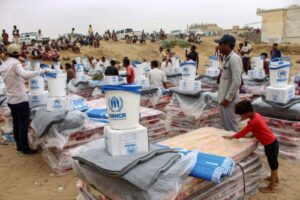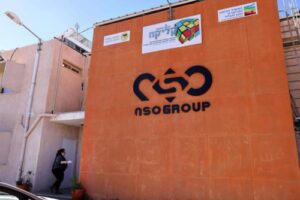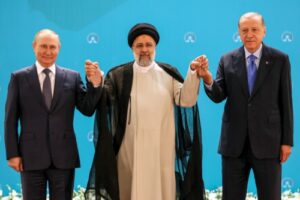
The National Interest Foundation Newsletter
Issue 154, July 21, 2022
Welcome to our NIF Newsletter. In this week’s headlines: rights watchdogs express alarm at the United Arab Emirates’ arrest and imprisonment sentencing of former Khashoggi lawyer Asim Ghafoor, the United Nations and others urge for Yemen’s warring parties to agree to a six-month truce extension as the ongoing ceasefire is set to expire in early August, a new report finds that Israeli firm NSO Group’s Pegasus spyware was used to target democracy advocates and human rights defenders in Thailand, and the leaders of Turkey, Russia, and Iran take part in a summit in Tehran.
United Arab Emirates’ Arrest of Asim Ghafoor

Ghafoor was detained while transiting through Dubai International Airport on his way to Istanbul. (Photo from AFP)
Rights Watchdogs Express Alarm at the United Arab Emirates’ Arrest and Imprisonment Sentencing of Former Khashoggi Lawyer Asim Ghafoor
During this past week, authorities in the United Arab Emirates (UAE) arrested Asim Ghafoor, the former lawyer of murdered journalist Jamal Khashoggi and a board member of the advocacy group Democracy for the Arab World Now (DAWN). Ghafoor was detained, and swiftly sentenced to a prison term, while transiting through Dubai on his way to Istanbul. DAWN and other rights watchdog organizations have voiced serious alarm over the incident, understandably outlining how the United Arab Emirates has been condemned for its track record of politically-motivated imprisonments, unjust trials, and repression of dissidents. They also highlighted the UAE’s use of its legal system to persecute and punish critics. Ghafoor has rejected the alleged charges, and stated he was unaware that the UAE had supposedly convicted him at some point in the past in absentia. Human rights groups have called on the Biden administration to secure the release of Ghafoor, with the United States disputing the UAE’s explanation for his detainment whereby Emirati authorities tried to frame it as a “coordinated move with the U.S. to combat transnational crimes.”
Ghafoor is a civil rights attorney based in Virginia who previously served as a lawyer for the late journalist Jamal Khashoggi and his fiancé, Hatice Cengiz. He was detained by plainclothes UAE security agents while traveling through Dubai International Airport, and was slated to continue on to his final destination of Istanbul to attend a family wedding. While waiting for his connecting flight to Turkey, the agents arrested Ghafoor, telling him that they needed to take him to Abu Dhabi “to clear a case against him.” Upon receiving word of this and informing the U.S. State Department about Ghafoor’s detainment, DAWN was assured that American officials were working to resolve the issue. Most troubling and questionable about the alleged charges is the fact that Ghafoor has expressed no knowledge of any legal matter against him in the UAE, and had even transited through Dubai International Airport less than a year ago without incident. Sarah Leah Whitson, Executive Director of DAWN, appropriately pointed out that “Detaining Ghafoor on the basis of an in absentia conviction without providing him any information, notice, or opportunity to defend against himself is a flagrant violation of his due process rights…Whatever trumped up legal pretext the UAE has cooked up for detaining Ghafoor, it smacks of politically-motivated revenge for his association with Khashoggi and DAWN, which has highlighted UAE human rights abuses and urged an end to arms sales to the country.”
Adding to the uncertainty and suspicion surrounding the Ghafoor case is the UAE’s track record of repression and human rights abuses. In a recent 2021 report, reputable rights organization Amnesty International delved into this, finding that government authorities there continued to commit serious human rights violations which included practices such as arbitrary detention, cruel and inhumane treatment of detainees, and suppression of freedom of expression. Furthermore, the UAE’s use of arbitrary detainment went beyond just Emirati nationals and also threatened foreign nationals as well, with several high-profile cases where the latter were indefinitely imprisoned on dubious charges. Journalists and non-governmental organizations (NGOs) who attempted to report on these types of occurrences were quelled, and authorities informed the media not to circulate or disseminate any information that is not published by them.
All of this legitimately raises doubts about both the alleged crimes levied against Ghafoor, as well as the UAE’s capabilities to provide him with due process and fair treatment. Thus, global rights groups have urged for the release of Ghafoor due to the UAE’s history of jailing many individuals via unjust trials and questionable charges.
Calls for Truce Extension in Yemen

Peace activists hope that the truce in Yemen, soon in need of an extension, will help aid agencies disperse much-needed supplies to civilians. (Photo from Getty Images)
The United Nations and Others Urge for Yemen’s Warring Parties to Agree to a Six-Month Truce Extension as the Ongoing Ceasefire is Set to Expire in Early August
A recent United Nations Security Council (UNSC) meeting briefed member nations regarding the importance and positive effects of the ongoing truce agreement in Yemen. The country’s special envoy, United Nations officials, and others have expressed that while the truce has helped to alleviate the dire humanitarian conditions in the war-torn nation, the UNSC must help extend it before the upcoming August 2nd expiration date. Peace and human rights activists have championed it for facilitating the flow of vital aid operations and eliminating further needless killing and destruction. The ceasefire has allowed relief agencies who face high levels of insecurity in the region to disperse resources to the Yemini people. However, the nation, which is particularly vulnerable to supply chain issues, still requires assistance in food, water, education, and health services, and thus a longstanding truce and cessation of harmful hostilities would be a welcome development.
The calls for an extension were met with seemingly unanimous support among the 15 member states of the UNSC. With political strife still rampant in Yemen, as well as shifting and growing geopolitical tension in the region, there are fears that the circumstances in the country could once again devolve into armed conflict without long-term and fruitful commitments from the international community. The ceasefire, which was originally put in place back in April for two months, before being extended again for the same period of time in early June, has been widely praised as a successful political victory for Yemen. The nation – which has been devastated by what most experts deem to be the world’s worst ongoing humanitarian crisis – is consistently on the radar of human rights activists and organizations as a top priority. Despite this, in recent years, little meaningful political progress was made, and the truce agreement was by far the most substantial positive development related to attempts at alleviating the conflict.
The truce has allowed aid agencies to more easily access Yemenis in desperate need of humanitarian assistance. Additionally, the prolonged access has opened the door for some important improvements on infrastructure and day-to-day life in Yemen, without the debilitating aerial bombardment from outside actors and political fighters which resulted in abhorrent civilian death. Even with these major improvements, the long-term and brutal nature of the conflict requires a far longer and more permanent ceasefire to continue the upwards trajectory. More is clearly needed in Yemen to return the nation to an improved and further livable state with regard to basic and fundamental human rights.
The political realities of an extension are unclear. The member nations of the UNSC were, in their sentiments, all in agreement that the ceasefire was critical and needed to be extended while calling on all sides to show restraint and commitment to humanitarian affairs within Yemen. With ongoing geopolitical considerations in the region though, it remains to be seen where certain outside actors will fall on maintaining the truce. Observers and experts can only hope that the recent U.S. attempts to bolster bilateral relations with Saudi Arabia, one of the major culprits in causing pain and suffering within Yemen, will be contingent on respect of the ceasefire and further alleviation of the dire humanitarian crisis. A long-term extension of the truce agreement in Yemen is critical in order to improve not only the circumstances there, but also provide greater peace and stability in the region at-large.
New Report on Use of Pegasus Spyware

This is just the latest instance where the spyware was found to have been used to target pro-democracy activists, raising more concerns among the human rights community. (Photo from AFP)
A New Report Finds that Israeli Firm NSO Group’s Pegasus Spyware was Used to Target Democracy Advocates and Human Rights Defenders in Thailand
A new report released by internet watchdog organizations has shown that 30 Thai pro-democracy activists have been the target of Pegasus spyware. This is just the latest of the numerous accounts of the Israeli-made spyware being used to suppress pro-democracy and human rights activities. In this particular case, the group of individuals, including academics, activists, and civil society leaders, were being surveilled by an unknown entity according to a forensic investigation. The investigation was conducted by the Canadian group Citizen Lab and Thai non-governmental organizations (NGOs) iLaw and Digital Reach. It was triggered after the activists from Apple advised that they had been victims of state-sponsored attacks aimed at distributing malware. Pegasus spyware can be used to read text messages, as well as track calls and locations of the intended target. Citizen Lab could not definitively confirm that the Thai government was responsible, but circumstantial evidence points towards that being the case. There is at least one known operator of Pegasus in Thailand, and this fresh unveiling has strengthened calls for a global moratorium on the repressive spyware.
The Pegasus spyware was created by NSO Group, an Israeli technology firm, and is found to have been used to suppress pro-democracy advocates in countries across the world with repressive regimes. Similar occurrences have repeatedly been revealed multiple times despite NSO Group attempting to claim that they vet any government agency they sell the harmful spyware to. Though it is no surprise that repressive governments use spyware to monitor and try to quell pro-democracy advocates and activities, it is alarming to analysts and observers that the firm selling the spyware is tied and linked to the Israeli government itself.
The latest findings support the long-held notion that the Pegasus spyware is targeting human rights activists, political dissidents, journalists, and lawyers all over the globe. This surveillance violates their basic human rights, including the right to privacy, free speech, movement, and the ability to peacefully protest and organize. It has been over a decade since the Pegasus spyware was released, and there is still currently no moratorium against its sale to repressive regimes, despite calls for this to be put into place. NSO Group is therefore profiting from human rights violations around the world. Besides the new uncovering in Thailand, there have been other recently reported instances in Morocco, Poland, El Salvador, Israel, Palestine, and Spain. These are only the clearly known cases, and it is likely that there are many other instances of its use that have gone either unnoticed or unreported. Not only does this spyware violate fundamental human rights, it has also been implicated in the heinous murder of journalists such as Jamal Khashoggi. It was discovered that two people who were close to Khashoggi were targeted by the spyware before and after his assassination in October of 2018 at the hands of Saudi authorities.
Some steps have been taken to try and inhibit the use of Pegasus, including the Biden administration adding the NSO Group to a Commerce Department list of restricted companies. Unfortunately, NSO Group has been using its ill-gotten gains to launch a powerful lobbying campaign to get off of this list in order to sell to American security firms and government organizations. Putting them on a restricted list is not enough. The democracies and defenders of freedom of the world must unite in an effort to ban the sale of this dangerous spyware program entirely, or if not at the very least to repressive regimes who are prone to use it to illegally monitor and suppress activists.
Summit in Tehran

Erdogan, Putin, and Raisi met this week to discuss the Syrian conflict and other pressing issues in the Middle East. (Photo from AP)
The Leaders of Turkey, Russia, and Iran Take Part in a Summit in Tehran
This week, a summit was held in Tehran between Turkish, Russian, and Iranian leaders to discuss the ongoing conflict in Syria, among other topics. The conference is part of the Astana Peace Process, which is the main mechanism aimed at ending Syria’s brutal 11-year conflict. There is another dimension however, as Turkey is deeply opposed to a semiautonomous Kurdish administration in Syria’s northeast region. President Erdogan of Turkey has repeatedly pledged to launch an offensive against the Kurdish militants, and demanded Russia and Iran back them in their goals. The Turkish government has long associated the PKK, or Kurdistan Workers Party, with the Kurdish administration in Syria. The PKK is a militant and political group responsible for attacks on Turkish soil, and they are classified as a terrorist organization by the United States, Turkey, and the European Union. The Turkish government says it wants to create a “safe zone” of 30 kilometers from their border. No major breakthroughs were made at this Tehran summit concerning Syria, and some analysts argued that it seemed to be more of a chance for each party to voice their demands and concerns related to this and other key issues.
Syrian Foreign Minister Faisal Mekdad arrived in Tehran shortly after the summit concluded. The minister stated in a press conference that President Erdogan “had many goals and policies that he wanted to impose on the meeting” and that those goals “were not achieved thanks to the serious discussions and opinions put forward by Iranian and Russian friends.” The talks were fraught with tension, as NATO member Turkey tries to maintain its delicate balancing act to sustain amicable ties with both Russia and Ukraine. They have so far been extremely careful, not directly taking either country’s side, instead attempting to play the role as a mediator between the two. They have pushed for an end to violence and held multiple summits between the two countries, but so far to no avail. There was also tension between Iran and Turkey, as Turkey continues its strategy of rapprochement with Saudi Arabia.
Among other topics discussed was the possibility of an arms sale between the countries, and the release of grain that has been trapped in Ukraine. These two areas were slightly more fruitful for the participants, as it has been reported that some headway was made in negotiations to release grain. This is a critical matter, as many countries in the Middle East continue to grapple with food shortages and skyrocketing prices as a result of the ongoing Russian invasion of Ukraine. Allowing the grain to be released would at least partially remedy these issues and help to stabilize many Turkish allies. New arms deals have not been put into place, but Turkey appeared to be very interested in buying air defense systems from Russia, much to NATO’s dismay. This comes after NATO allies refused to sell air defense systems on acceptable terms.
Overall, the Tehran summit is another example of a new emerging reality in Middle East geopolitics, where elements of realpolitik are beginning to show more prominently. Turkey has been working with both its traditional allies in NATO and traditional adversaries like Russia and Saudi Arabia to meet its own needs. It will remain to be seen if Turkey can maintain this balancing act without causing any major disruptions.
Enter the text or HTML code here
